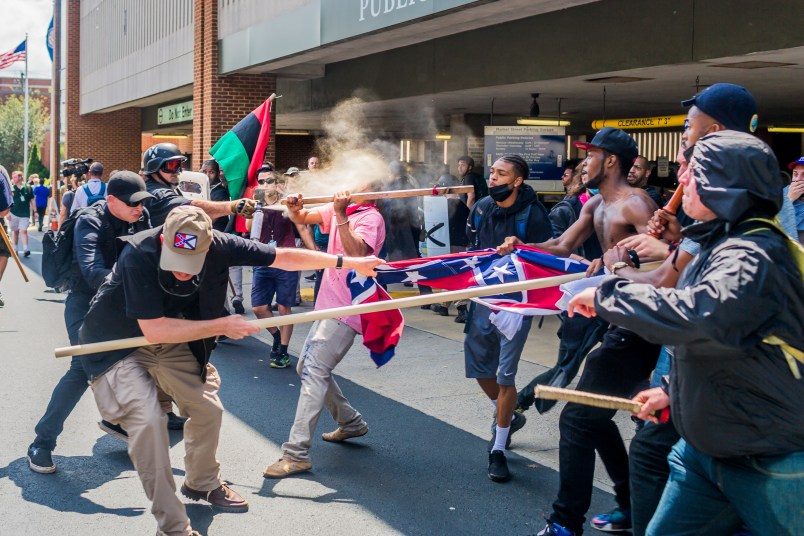Yesterday, TPM’s Allegra Kirkland published this piece on how numerous tech platforms, social media networks, payment services and others have shut down access to alt-right, Nazi and white supremacist groups. I was also interested to read this piece in the Times about how this mass banning – even if salutary in this instance – points to the massive and arbitrary power of private companies in controlling the venues in which a vast amounts speech occur today.
I found the Times piece utterly fascinating. It’s a full of insights. Like take this paragraph …
It is worth noting that the platforms most flamboyantly dedicated to a borrowed idea of free speech and assembly are the same ones that have struggled most intensely with groups of users who seek to organize and disrupt their platforms. A community of trolls on an internet platform is, in political terms, not totally unlike a fascist movement in a weak liberal democracy: It engages with and uses the rules and protections of the system it inhabits with the intent of subverting it and eventually remaking it in their image or, if that fails, merely destroying it.
Wow, that is really just right.
And yet, I think the Times article by John Herrman basically misses the mark in thinking that racist groups’ reaction to this banning was planned or showed some deeper understanding or even sympathy with the authoritarian nature of these platforms. That strikes me as a reach too far that really isn’t backed up by any of the evidence or what we know of these people. Indeed, Herrman notes that online racists have prepared for just this moment.
They’ve also been preparing for this moment or one like it: There are hard-right alternatives to Twitter, to Reddit and even to the still-mostly-lawless 4chan. There are alternative fund-raising sites in the mold of GoFundMe or Kickstarter; there’s an alternative to Patreon called Hatreon. Like most of these new alternatives, it has cynically borrowed a cause — it calls itself a site that ‘‘stands for free speech absolutism’’ — that the more mainstream platforms borrowed first.
(See Allegra’s piece for a closer look at the guy behind ‘Hatreon’.)
But again I think this misses the point. Alternative paths for raising money are important for sustaining these movements. But if white supremacists create a version of Twitter specifically targeted to racists and assholes, who cares? It doesn’t mean nothing. As I’ve discussed in other contexts, allowing isolated communities to become aware of themselves as groups is a critical part of empowering them. The same dynamic, which historians have observed with other media platforms and technologies for centuries, applies as much to ‘good’ groups as ‘bad’ ones. But a critical part of how social media especially empowered the racist right is precisely that it allowed them to set up shop on equal terms on platforms that have mass public buy-in.
The mix of provocation, harassment and trolling is a major part and in some ways the totality of what the digital far-right is about. That’s why racist activists are so eager to give speeches at Berkeley. They get a reaction. Fights start. They create polarization. If some racist freak holds that speech is his backyard or basement with ten friends, who cares? No one does. No one even knows … That is truly the unique hell of online racist provocateurs: no one even knowing they’re ranting. A new version of Twitter for racists only will be the digital equivalent of the same thing. As Allegra puts it in her piece, they’re relegated to their own echo-chamber. It’s not nothing. It’s still a tool for organizing, planning. But the fuel of today’s digital racist right is provocation and reaction. Absent that, much of the energy will be difficult to sustain.
We still have a larger problem with platform monopolies and their arbitrary hold on speech and their monopoly power over the economy. But whatever the broader rights and wrongs of this mass banning, thinking the alt-righters somehow get the last laugh does not add up.









